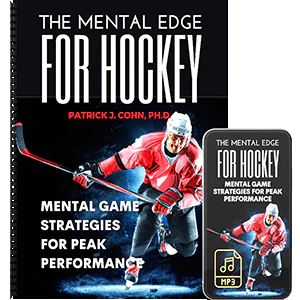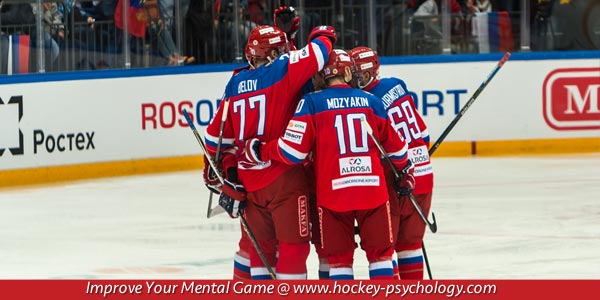How Do Teams Benefit From Team Confidence?
Winning hockey clubs exhibit “team confidence.”
Team confidence includes: trusting in the abilities of teammates, believing in your own abilities, having well defined roles, and adopting a style of team play that focuses on your strengths.
A hockey team who plays as a confident team gains an advantage by playing in the moment, focusing on the process and taking control over the flow of the game.
The Buffalo Sabres are struggling to find their confidence as a team for the 2013-14 season. The Sabres are off to a slow start and, currently, have the worst record in their division, 1-8-1. The Sabres last made the playoffs since the 2011 and have been playing very tentatively so far this year.
Ryan Miller, starting goaltender for the Sabres, has noticed his team’s hesitant play, “We need a little bit of confidence. We have a good group of guys that can move the puck. I think we’re just a little bit timid. We’re waiting for something good to kind of happen…”
Teams that lack confidence wait for good things to happen instead of making good things happen. Teams that lack confidence are reactionary, playing back on their heels and being a step behind their opponents.
Miller recognizes the key components needed for team confidence, “We need to control the puck a little more, and these guys have the skill to do it. They’re going to start stepping up. It just takes a little bit of confidence, a little bit of time, and I think we can start seeing some improvements there. It’s definitely something we can do.”
Hockey teams do well when they control the puck, thus dictating the flow of the game.
Players must believe in their abilities and the skills of their teammates.
Confident hockey teams trust in their skill sets and their game plan, which allows the team to commit to a winning style of play.
Ron Rolston, coach of the Sabres, stated his team needs to be more process-oriented and focused on the present moment, “I’m just worried about the process of winning right now. We have to get to that point before we worry about the rest. We’ve got to have a process of playing well period-to-period, and then the results will come. The results are going to come with the process, but if the process isn’t there, you’re not going to have results.”
Teams Gain Confidence When they Focus on the Process
Hockey players gain a sense of control when they focus on the process, what they can do in the present moment instead of worrying about the future or fretting about past loses or mistakes.
Playing with confidence is all about overcoming the fear of what could happen in the future.
You can increase your confidence by focusing on the process (what you can do now), knowing your strengths (what are your assets), and playing to your strengths (create a game plan that highlights your strengths).
You can be a confident athlete and a member of a confident hockey team with the commitment and hard work.
Sign Up For a Free Hockey Mental Game eBook!
Related Articles on Hockey Mental Game:
- Stable Confidence for Ice Hockey Players
- How to Grow Confidence After Losing Games
- How to Improve Team Confidence
*Subscribe to The Sports Psychology Podcast on iTunes
*Subscribe to The Sports Psychology Podcast on Spotify
The Mental Edge for Hockey

The Mental Edge for Hockey teaches you proven and simple mental game strategies so you can overcome fear of failure, lack of confidence, slumps or poor composure, take your practice game to competition, and boost your confidence in hockey. You learn simple, actionable mental game strategies to help you perform at your peak!
I’ve worked with athletes for 30 plus years – and know the top challenges that undermine performance when you perform in games. Now you can tap into my expertise and experience in coaching hockey players on the mental game.
In this program, you’ll learn the TOP 10 mental training lessons for hockey players – the same strategies I teach one-on-one athletes I coach on the mental game. My clients pay thousands of dollars for personal coaching, but now you can have the same strategies to improve your mental game – at a fraction of the price.

Leave a Reply